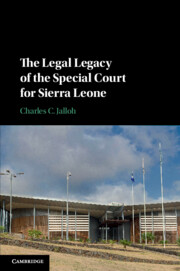Book contents
- The Legal Legacy of the Special Court for Sierra Leone
- The Legal Legacy of the Special Court for Sierra Leone
- Copyright page
- Dedication
- Contents
- Preface and Acknowledgments
- Table of Authorities
- Abbreviations
- 1 Introduction
- 2 The Sierra Leone Conflict
- 3 The Establishment of the Special Court for Sierra Leone
- 4 The Special Court’s Jurisdiction, Organization, and Trials
- 5 “Greatest Responsibility” Personal Jurisdiction
- 6 Forced Marriage As a Crime Against Humanity
- 7 Child Recruitment As a War Crime
- 8 Head of State Immunity
- 9 Amnesties
- 10 Special Courts and Truth Commissions
- 11 Conclusion
- Appendices
- Selected Bibliography
- Index
7 - Child Recruitment As a War Crime
Published online by Cambridge University Press: 29 July 2020
- The Legal Legacy of the Special Court for Sierra Leone
- The Legal Legacy of the Special Court for Sierra Leone
- Copyright page
- Dedication
- Contents
- Preface and Acknowledgments
- Table of Authorities
- Abbreviations
- 1 Introduction
- 2 The Sierra Leone Conflict
- 3 The Establishment of the Special Court for Sierra Leone
- 4 The Special Court’s Jurisdiction, Organization, and Trials
- 5 “Greatest Responsibility” Personal Jurisdiction
- 6 Forced Marriage As a Crime Against Humanity
- 7 Child Recruitment As a War Crime
- 8 Head of State Immunity
- 9 Amnesties
- 10 Special Courts and Truth Commissions
- 11 Conclusion
- Appendices
- Selected Bibliography
- Index
Summary
This chapter examines the contribution of the Special Court for Sierra Leone caselaw on the prosecution of child recruitment as a war crime under international law. The Sierra Leone conflict was widely known for its conscriptions of children as child soldiers, who under the influence of fear, drugs, and hallucinogens committed grave atrocities across Sierra Leone. Although the crime of child recruitment and conscription was recognized in 1998 when the Rome Statute for the International Criminal Court was adopted, the Special Court was the first court to successfully charge and prosecute this particular war crime. In analyzing this novel prosecution, this chapter first addresses the creation and recognition of the war crime of child recruitment within the Rome Statute. Second, it examines the reasoning of the Appeals Chamber in holding that child recruitment is a crime recognized under customary international law. Third, it assesses the impact of the Special Court’s work on prosecuting child recruitment in developing the actus reus and mens rea of the crime. Finally, this chapter examines the impact of the Special Court on the International Criminal Court’s prosecutions of child recruitment in the recent cases of Lubanga and Ongwen.
Keywords
- Type
- Chapter
- Information
- The Legal Legacy of the Special Court for Sierra Leone , pp. 187 - 213Publisher: Cambridge University PressPrint publication year: 2020

